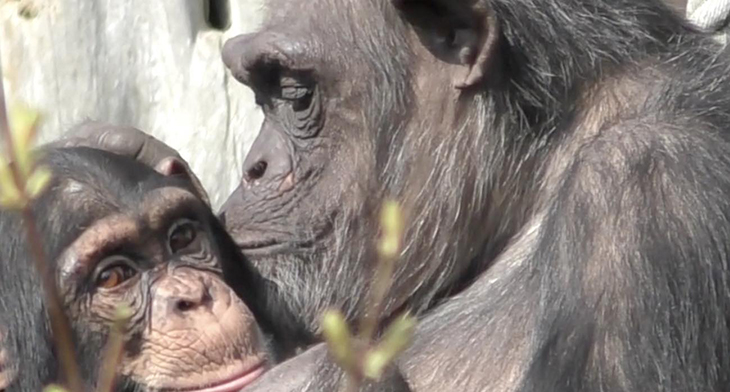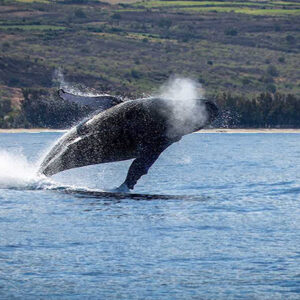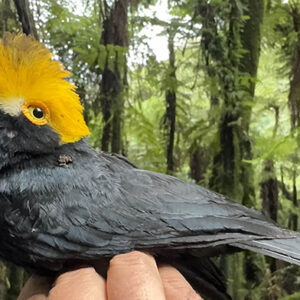
New research from Johns Hopkins University unveils the remarkable ability of apes to recognize friends they haven’t encountered for decades, marking the longest recorded non-human social memories to date.
The study, which documents the longest-lasting non-human social memories on record, reveals that apes can recognize images of group mates they haven’t encountered for over 24 years. Furthermore, they exhibit heightened enthusiasm when presented with pictures of their close friends.
Published recently in the Proceedings of the National Academy of Sciences (PNAS), the study sheds light on the enduring social bonds among primates, emphasizing the shared evolutionary roots between humans and our closest relatives.
“We tend to think about great apes as quite different from ourselves but we have really seen these animals as possessing cognitive mechanisms that are very similar to our own, including memory,” said one of the study’s authors, Dr Laura Lewis, a biological anthropologist at University of California, Berkeley.
“I think that is what’s so exciting about this study.”
The inspiration for this study stemmed from the researchers’ personal interactions with primates, where they noted instances of animals seemingly recognizing them even after prolonged absences.
“You have the impression that they’re responding like they recognize you and that to them you’re really different from the average zoo guest,” said the study’s senior author Dr. Christopher Krupenye of Johns Hopkins.
“They’re excited to see you again.”
One poignant example occurred in 2016, when a 59-year old chimpanzee named ‘Mama’ from the Royal Burgers Zoo in the Netherlands, recognized a long-time caregiver, Jan van Hooff, shortly before her passing, despite not having seen him in years.
This emotional encounter prompted the researchers to investigate the extent of apes’ lasting memories for familiar social partners empirically.
The study findings revealed that both chimpanzees and bonobos possess the ability to recognize individuals they haven’t seen for multiple decades, with a notable preference for former companions and an even stronger affinity towards those with whom they shared positive relationships.
“It suggests that this is more than just familiarity, that they’re keeping track of aspects of the quality of these social relationships,” said Dr. Krupenye.
Collaborating with institutions across different locations, Edinburgh Zoo in Scotland, Kumamoto Sanctuary in Japan, and Planckendael Zoo in Belgium, the research team collected photographs of apes that had either left their habitats or passed away, individuals unseen by participants for periods ranging from nine months to an astonishing 26 years.
During the experiments, the apes were presented with pairs of photographs – familiar group mates versus strangers – while their eye movements were tracked using non-invasive technology. The results demonstrated a significant tendency among the apes to gaze “significantly” longer at former group mates, irrespective of the duration of separation.
Moreover, the apes exhibited heightened attention towards individuals with whom they had positive interactions, showcasing the enduring impact of social bonds among these animals.
One particularly striking observation involved bonobo Louise, who displayed a remarkable bias towards her sister Loretta and nephew Erin, whom she hadn’t seen for over 26 years. Over eight trials, she showed a “strikingly robust” looking bias toward both of them, as seen in the video below.
The findings indicate that the social memory of great apes may extend beyond 26 years, surpassing the majority of their 40 to 60-year average lifespan.
Incredibly, this longevity in social memory parallels that of humans, whose memory begins to decline after 15 years but may persist for up to 48 years after separation.
This enduring social memory suggest that such cognitive abilities likely existed in our common evolutionary ancestors millions of years ago. According to Krupenye, the notion that apes retain information about the quality of their relationships represents another strikingly similarity between humans and apes uncovered by this study.
Moreover, the study prompts questions regarding whether apes experience a sense of longing for individuals with whom they are no longer in contact, particularly their friends and family members.
Dr. Lewis said, “The idea that they do remember others and therefore they may miss these individuals is really a powerful cognitive mechanism and something that’s been thought of as uniquely human.”
“Our study doesn’t determine they are doing this, but it raises questions about the possibility that they may have the ability to do so.”
The researchers are planning to look into whether long-lasting social memories are special to great apes, or possibly something other primates experience as well.
What are your thoughts? Please comment below and share this news!
True Activist / Report a typo


